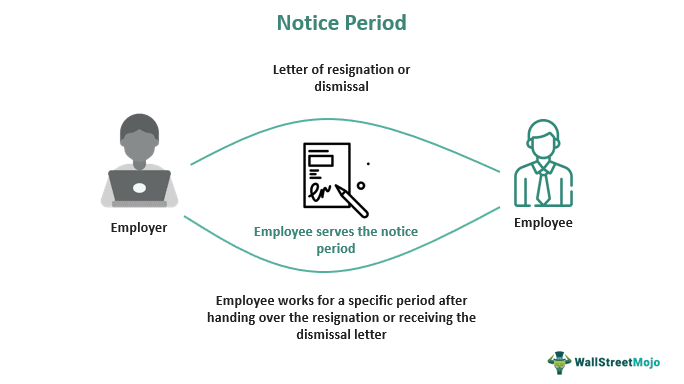Table Of Contents
Notice Period Meaning
Notice period refers to the period between handing in the resignation letter or dismissal letter and the last working day. There are different types of it, like contractual notice period determined in the employment contract and statutory notice period, the legal minimum amount that an employer should offer.

It begins when an employee turns in a letter of resignation or receives a letter of dismissal and ends when they exit the job. The period is essential for both the employer and the employee. For example, in case of resignation, it helps the employer to find a suitable replacement. In case of dismissal, the period gives the employee sufficient time to get a new job.
Key Takeaways
- The notice period is the term between the reception of a letter of resignation or dismissal and the last working day.
- The term of notice gives the employee and employer sufficient time for further activities associated with the resignation or dismissal.
- For example, in case of resignation, the employer can fill the open position by finding a replacement, and in case of dismissal, the employee can find a new job.
- A buyout clause in an employment contract allows an employee to exit the job without serving the notice but must meet the predefined conditions, like payment to the employer.
Notice Period for Resignation Explained
The notice period is a result of the agreement between the employer and the employee. The employee must serve the job notice period before they leave the organization. During this period, the resigning employee can prepare for the exit; for instance, they can prepare the handing over the report to give it to the successor or the company.
During this period, the HR team or the manager needs to reassign the work and find a replacement. For example, they can start writing a job description, reviewing applications, and conducting interviews with potential candidates to fill the position. Additionally, it allows the organization to assign responsibilities to other employees so they can take over. The whole process will be complex if the employee leaves the organization without notice. Furthermore, the period's proper utilization also contributes to managing human resource accounting.
The employee notice period varies between countries and companies. Generally, it can be two weeks, one month, or two months. However, it may be altogether different when it comes to the statutory redundancy notice period. For example, in the United States, no notice period is usually mandatory.
However, most employees provide two weeks' notice. In the UK, it is at least one week if the employment term is between one month and two years. In Poland, it is two weeks if employed below six months. In Switzerland, it is three months if employed for more than ten years. Companies also set specific rules and regulations for resigning employees during the notice period.
There are various factors an employer and resigning employee should consider regarding the notice period for resignation:
- Employees should consider their role in the company before deciding whether to buyout the notice period. Finding someone to fill an entry-level position will be easy for the employer. However, the period is essential if the resigning candidate is at a higher level, like in a managerial role, because it might take longer to recruit someone with the same experience level.
- Additionally, current projects must be taken into account. They are analyzing whether the resignation will affect these projects. One can choose the notice period depending on how much time is needed to do the project.
- An employee should search for a new candidate to fill the open position during this period.
Notice Period Buyout
A notice period buyout clause is a provision in an employment contract that allows an employee to terminate their agreement with the employer and leave the company immediately without serving a notice period. For immediate leaving, the employee has to make the payment mentioned in the contract to the employer. Sometimes the hiring company to which the employee is moving will make the final settlement according to the buyout clause instead of the employee.
A notice period buyout has several advantages:
- It enables the employee to leave the company sooner rather than later without waiting for the end of their notice tenure. It is advantageous if the employee has to start working immediately in the new job.
- It can prevent conflict between the employee and the company.
Examples
Let us look at examples to understand the concept better:
Example #1
Ms. Rita Wilson got a new job offer from a broadcasting company called XYZ news and is willing to join the company. She is currently a journalist at ABC News, another broadcasting company. She notified her manager and HR about the new offer and decision and submitted the formal resignation letter. According to the employment contract and company policy, Rita must serve a one-month notice before leaving her current position.
Example #2
Ms. Anna Joe has an official notice period of 90 days and planning to buyout 60 days of the notice. Furthermore, her offer letter clearly states that she needs to pay her basic salary instead of her notice period if the period is not served. So Anna is willing to pay the buyout amount to comply with the terms and leave the job on good terms.
Email Template
Formal resignation letter sample with notice period:

